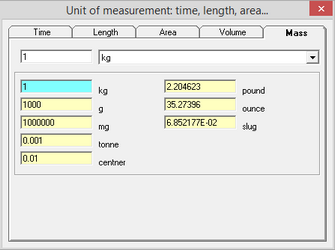
Tab "Mass" of the dialog window "Unit converter (part 2)"
Kilogram (kg) |
The kilogram (also kilogramme) is the base unit of mass in the metric system, formally the International System of Units (SI), having the unit symbol kg. The kilogram was originally defined in 1795 as the mass of one litre of water.In 1799, the platinum Kilogramme des Archives replaced it as the standard of mass. In 1879, a cylinder of platinum-iridium, the International Prototype of the Kilogram (IPK) became the standard of the unit of mass for the metric system, and remained so until 2019. |
Gram (g) |
The gram is a SI system unit of mass. A gram is defined as one thousandth of the SI base unit, the kilogram, or 1×10−3 kg. |
Milligram (mg) |
1mg = 0.001g |
Tonne (t) |
1t = 1000kg |
Zentner |
The zentner is an obsolete name for a unit of mass which was used predominantly in Germany, Austria, and Switzerland, although it was also sometimes used in the United Kingdom – for example, as a measure of the weight of certain crops including hops for beer production. Like the notion of hundredweight, the zentner is the weight of 100 units, where the value of the unit depends on the time and location. Traditionally the unit was one hundred pounds (German Pfund) with the precise value being context-dependent, making one zentner equal to about 50 kilograms. In later times, with the adoption of the metric system, the value came to denote exactly 50 kg, at least in Germany; in Austria and Switzerland the term is now in use for a measure of 100 kg, as it is in Russia. In Germany a measure of 100 kg is named a Doppelzentner. 1 zentner = 100 kg |
Pound (lb or lbs) |
The pound or pound-mass is a unit of mass used in the imperial, United States customary and other systems of measurement. Various definitions have been used; the most common today is the international avoirdupois pound, which is legally defined as exactly 0.45359237 kilograms. The unit is descended from the Roman libra (hence the abbreviation "lb"). The English word pound is cognate with, among others, German Pfund, Dutch pond, and Swedish pund. |
Ounce (oz) |
The ounce is a unit of mass, weight, or volume used in most British derived customary systems of measurement. The common avoirdupois ounce (approximately 28.3 g) is 1⁄16 of a common avoirdupois pound. |
Slug |
The slug is a derived unit of mass in a weight-based system of measures, most notably within the British Imperial measurement system and in the United States customary measures system. One slug has a mass of 32.1740 lb (14.59390 kg) based on standard gravity, the international foot, and the avoirdupois pound. At the Earth's surface, an object with a mass of 1 slug exerts a force downward of approximately 32.2 lbf or 143 N. |